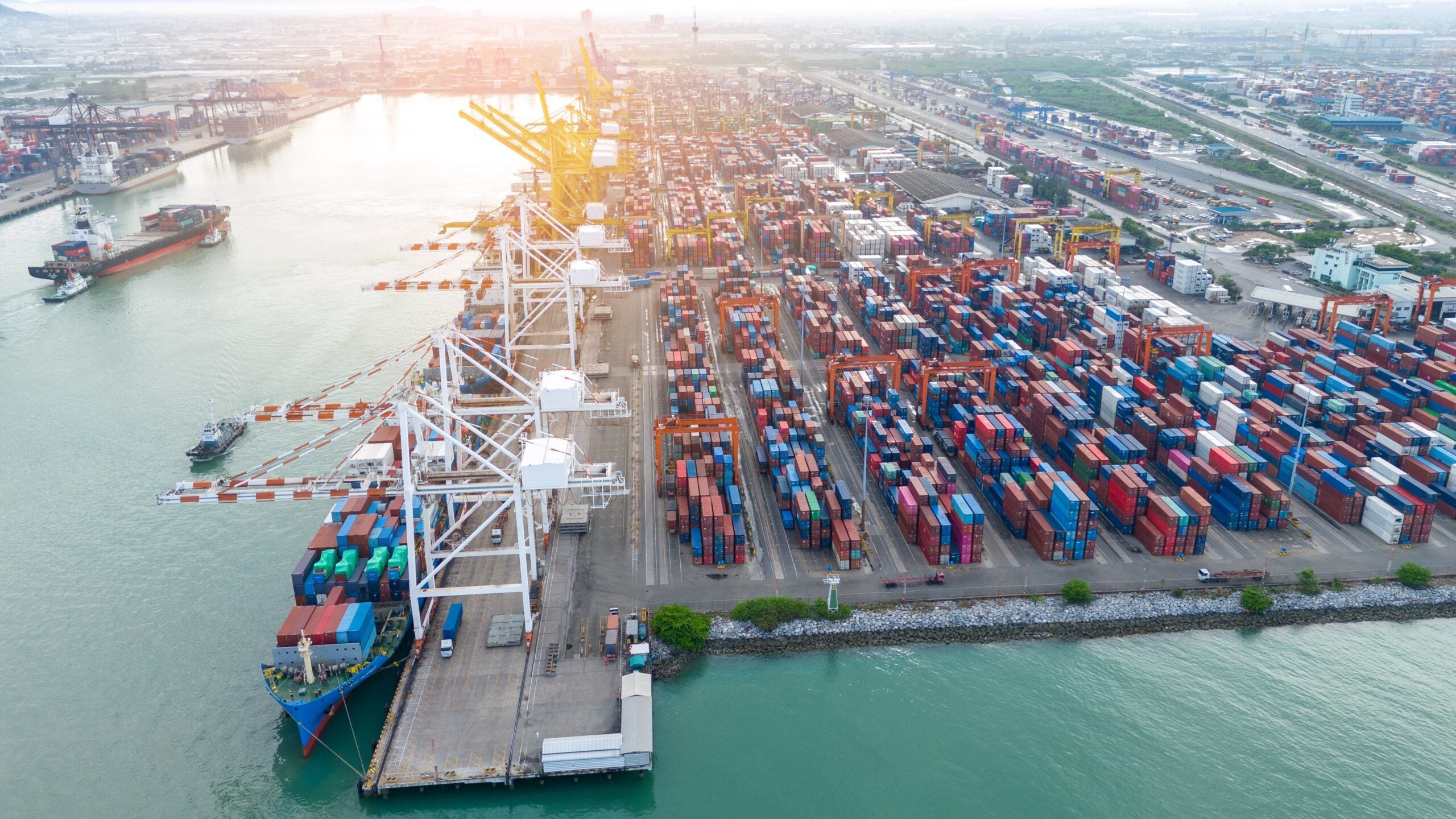Table of contents
Today, January 7th, 2025, negotiations between the International Longshoremen Association (ILA) and the U.S. Maritime Alliance (USMX) resume. They’ll have until January 15th, 2025, to reach a labor agreement that satisfies all parties. Otherwise, the ILA is prepared to strike, much like they did during their 3-day walkout in October.
Following that walkout, the two organizations reached a tentative agreement that provided a 62% wage increase over six years for ILA workers. While this solved wage concerns, the issue of automation in the ports remained largely unresolved. ILA President Harold Daggett agreed that the union would return to its posts and end its strike following the agreement, but further negotiations would need to be held regarding the issue of automation.
Briefly, the ILA wants protections from automation for job security, while the USMX wants to expand automation in the ports to increase efficiency and operational safety. Daggett’s hard anti-automation stance hasn’t waivered since the beginning of these negotiations, and the next few days will be critical in preventing a major supply chain challenge in the market.
Minor disruptions in the ports, like the 3-day walkout in October, are relatively easy for the market to manage. A more extensive disruption, such as a multi-day or multi-week strike, can significantly damage the supply chain, causing 3-6 month delays in some cases.
Companies should prepare for the worst-case scenario, just in case negotiations fail and the union walks out. National Business Capital will be watching this situation closely, and we suggest that your company does the same.
On November 13th, 2024, further negotiations between the Maritime Alliance and the International Longshoremen’s Association (I.L.A) stalled after no progress was made on the issue of automation. The ILA wants protection against port automation that can eliminate jobs, while the Maritime Alliance wants to modernize the ports to tackle worker safety challenges. The ILA President Harold Daggett was quoted in a CNBC article, saying, "The ILA negotiated restrictions on automation and semi-automation in the last contract. The ILA just wants to tighten the language that no automation means no automation." Although not directly involved in negotiations, the Maryland Port Administration, which owns Baltimore’s main cargo terminals, is "closely monitoring the issue" and encouraging both parties to reach an agreement. A stall in negotiations this close to their January 15th deadline raises the risk of another strike considerably. The damage to the supply chain would be significant, and there's no telling how long their next strike would last. We're continuing to monitor this situation - check back for future updates!
On Thursday, October 3rd, the International Longshoremen’s Association (I.L.A) reached a tentative deal to suspend the strike until January 15th, 2025. The agreement yielded a 62% pay raise over 6 years for dockworkers and, more importantly, prevented a long-term port shutdown. While this is good news, the agreement merely delays the strike. If no further progress can be made by the January 15th deadline in 2025, the ports may very well shut down again, and we'll find ourselves right back where we started. In a Fox News interview following the agreement, National Business Capital's CEO stated, "I think they should be able to square this away within 90 days. Anyone in business that's tied to this, though, I would still hedge against that. A deal's not a deal until it's done... "
On Tuesday, October 1st, 2024, the International Longshoremen’s Association (I.L.A) voted to strike, signaling the effective closure of the East and Gulf Coast's busiest ports. The Longshoremen’s Association, the largest union of maritime workers in North America, had attempted to reach a new labor contract with the United States Maritime Alliance (USMX) before their previous contract expired on September 30th, 2024. Along with general wage negotiations, the union had concerns about foreign interests in ports and automation threatening job security.
Negotiations stalled, and the strike began. The walkout is the first East Coast dock strike since 1977. Over 47,000 workers have left their posts and don’t plan on returning until their demands are met, essentially pressing “pause” on all port activities.
The Longshoremen’s Association, the largest union of maritime workers in North America, had attempted to reach a new labor contract with the United States Maritime Alliance (USMX) before their previous contract expired on September 30th, 2024. Along with general wage negotiations, the union had concerns about foreign interests in ports and automation threatening job security.
Negotiations stalled, and the strike began. The walkout is the first East Coast dock strike since 1977. Over 47,000 workers have left their posts and don’t plan on returning until their demands are met, essentially pressing “pause” on all port activities.
On November 13th, 2024, further negotiations between the Maritime Alliance and the International Longshoremen’s Association (I.L.A) stalled after no progress was made on the issue of automation. The ILA wants protection against port automation that can eliminate jobs, while the Maritime Alliance wants to modernize the ports to tackle worker safety challenges. The ILA President Harold Daggett was quoted in a CNBC article, saying, "The ILA negotiated restrictions on automation and semi-automation in the last contract. The ILA just wants to tighten the language that no automation means no automation." Although not directly involved in negotiations, the Maryland Port Administration, which owns Baltimore’s main cargo terminals, is "closely monitoring the issue" and encouraging both parties to reach an agreement. A stall in negotiations this close to their January 15th deadline raises the risk of another strike considerably. The damage to the supply chain would be significant, and there's no telling how long their next strike would last. We're continuing to monitor this situation - check back for future updates!
On Thursday, October 3rd, the International Longshoremen’s Association (I.L.A) reached a tentative deal to suspend the strike until January 15th, 2025. The agreement yielded a 62% pay raise over 6 years for dockworkers and, more importantly, prevented a long-term port shutdown. While this is good news, the agreement merely delays the strike. If no further progress can be made by the January 15th deadline in 2025, the ports may very well shut down again, and we'll find ourselves right back where we started. In a Fox News interview following the agreement, National Business Capital's CEO stated, "I think they should be able to square this away within 90 days. Anyone in business that's tied to this, though, I would still hedge against that. A deal's not a deal until it's done... "
Watch our CEO's full interview above!
"It's a smart idea to be prepared." continues Camberato. Businesses should keep this in mind as they plan their 2025 initiatives, as well as the impact of proposed tariffs on imports. Proactively ordering inventory, materials, equipment, etc., can put your company one step ahead of the trend.On Tuesday, October 1st, 2024, the International Longshoremen’s Association (I.L.A) voted to strike, signaling the effective closure of the East and Gulf Coast's busiest ports.
 The Longshoremen’s Association, the largest union of maritime workers in North America, had attempted to reach a new labor contract with the United States Maritime Alliance (USMX) before their previous contract expired on September 30th, 2024. Along with general wage negotiations, the union had concerns about foreign interests in ports and automation threatening job security.
Negotiations stalled, and the strike began. The walkout is the first East Coast dock strike since 1977. Over 47,000 workers have left their posts and don’t plan on returning until their demands are met, essentially pressing “pause” on all port activities.
The Longshoremen’s Association, the largest union of maritime workers in North America, had attempted to reach a new labor contract with the United States Maritime Alliance (USMX) before their previous contract expired on September 30th, 2024. Along with general wage negotiations, the union had concerns about foreign interests in ports and automation threatening job security.
Negotiations stalled, and the strike began. The walkout is the first East Coast dock strike since 1977. Over 47,000 workers have left their posts and don’t plan on returning until their demands are met, essentially pressing “pause” on all port activities.
How the Port Strike Will Impact Businesses
The longshoremen strike has major implications for U.S. commerce. Incoming cargo ships must either divert to an operational port or sit idle until workers return. Not only will this inflate shipping costs heavily, but it also delays the arrival of any incoming shipments for U.S. businesses. The port strike has macroeconomic consequences that may mirror the supply chain nightmare we experienced during the pandemic, if not worse. Here are the industries that will be most impacted:- Manufacturing: Manufacturers that rely on overseas material orders will likely have their operations delayed indefinitely unless they can establish a new supplier relationship. If manufacturers can’t order their next round of materials, their facilities will halt, and they’ll begin to hemorrhage money. It will cause a major slowdown, from electronics manufacturing to plastics and textiles, that might become the norm if there’s no progress in union negotiations.
- Construction: Similarly to manufacturing, a material shortage will limit what the industry can achieve. Available materials will be sold at a premium, while a majority of companies will go without access entirely. Whether construction companies pass this cost on to consumers or can handle the loss, construction activity will likely dampen for as long as the strike persists.
- Retail & eCommerce: When manufacturing encounters challenges, retailers and eCommerce businesses feel the pressure not long after. Inventory orders will become much more challenging, if not impossible, depending on the industry. If they can’t get their hands on products, the industry can miss revenue goals significantly. Companies that didn’t purchase their holiday inventory in advance will be impacted much sooner than their proactive counterparts.
- Food Service: Restaurants and food service providers may have incoming shipments of food spoil before the crates are unpacked. Not only does this cause an immediate loss of revenue, but it can put their operations on pause as they await the next shipment.
- Transportation: An industry that’s familiar with supply chain challenges, transportation will undoubtedly struggle until the strike ends. National Business Capital’s CEO, Joseph Camberato, stated in a Fox News interview, “Many companies over-leveraged themselves to handle the pent-up demand stemming from the pandemic. They didn’t make cuts quickly enough when demand changed, which has challenged the industry over the last 12-24 months. Supply chain disruptions equate to a loss of work.”
Watch our CEO's full interview on Fox News above!
What Companies Can Do in Response
If the longshoremen strike will impact your operations, we urge you to take action as soon as possible. Here are some of the things you should consider:- Buying in bulk from available suppliers, when possible, to qualify for bulk order discounts.
- How you’ll price your products/services. Will you take a loss because of the shipping delays, or will you pass that cost down to the consumer?
- Avoiding disruption. If you’re going to lose business, how can you supplement the lost income?






